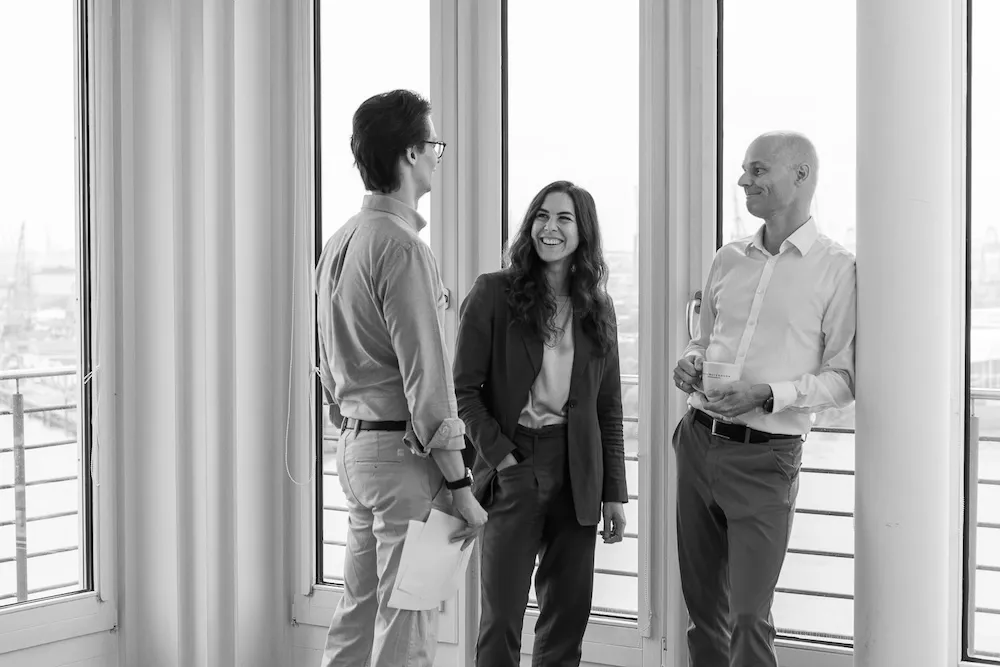A look behind the scenes of the HARTE-BAVENDAMM Academy
The four cornerstones of the HB Academy
Our workshops and training sessions at the HARTE-BAVENDAMM Academy are organised into four thematic blocks and generally take place every fortnight. In addition to regular case law updates, sessions on new legislation and training on current topics, our continuous learning program also offers workshops on training in negotiations, improving presentation skills, as well as resilience and communication training.
Participation in the HB Academy is open not only to our associates, but also to all of those who are completing their legal clerkship or internship with us or who work for us as research assistants.

The HARTE-BAVENDAMM Academy covers a wide range of topics:
- 𝗛𝗕 𝗟𝗲𝗴𝗮𝗹 – Exploring the latest case law, key focus topics and legislative plans in the field of intellectual property and unfair competition law.
- 𝗛𝗮𝗿𝘁𝗲-𝗕𝗔𝗩𝗘𝗡𝗗𝗔𝗠𝗠 𝗦𝗸𝗶𝗹𝗹𝘀 – Enhancing language, negotiation, and presentation abilities.
- 𝗦𝗼𝗳𝘁𝗲-𝗕𝗔𝗩𝗘𝗡𝗗𝗔𝗠𝗠 𝗦𝗸𝗶𝗹𝗹𝘀 – Focusing on the well-being of our team, soft skills and effective communication
- 𝗛𝗕 𝗙𝘂𝘁𝘂𝗿𝗲 – Exploring cutting-edge topics like blockchain, AI, and legal tech.
Especially, the last two pillars of the “HARTE-BAVENDAMM Academy” are particularly dear to our heart. Soft skills help our team master the demands of a legal career while maintaining a healthy work-life balance. We also believe that they are a cornerstone for building strong and lasting client relationships. This is because soft skills complement our legal expertise and allow us to provide our clients with a client-centered approach on a personal level that goes beyond simply understanding the law. In addition, we firmly believe that our continuous adaptation to new technologies is essential for staying competitive in a technology-driven legal landscape.

Workshop on "Appearance and Body language" with Carmen Schön
We generally prepare the content of the HARTE-BAVENDAMM Academy ourselves. After all, we already inhabit a great deal of expert knowledge within the firm that we want to share. However, for certain topics, we deliberately bring in external coaches and trainers.
Last week, Carmen Schön was our guest and organised a half-day workshop on the topic of "Appearance and Body language" in our offices. As a lawyer herself and former head of a legal department, Carmen knows first-hand the criteria for how law firms win pitches and what inspires clients. Thanks to her professional training as a TV presenter, she was able to show us impressively how people are most convincing in conversation with their rhetoric, body language and voice. We appreciated to receive many valuable tips and suggestions from her.

The importance of body language (in Carmen's own words: "60 % body language, 30 % voice, 10 % content") and the signals that we often unconsciously send towards other people in the room became really clear to us all when Carmen, with her natural wit and charm, gave us some visual demonstration of various types of gesticulations such as "the gun" or "the hedgehog".
After a good two hours of theory followed by an exchange of our own experiences, we were asked to put what we had just learnt into practice: Each participant had to give an impromptu pitch of around 2-3 minutes in front of the camera and the others afterwards gave feedback.
The workshop with Carmen was great fun for all of us, very instructive and definitely brought us closer together as a team. Thank you, Carmen, for these inspiring hours!

You might also be interested in this
A trademark is one of a company’s most valuable assets. It stands for quality, recognizability, and trust among customers. In addition, a trademark enables a clear differentiation from the competition and strengthens the brand presence in the long term. These and many other advantages speak in favor of protecting a sign as a trademark at an early stage.
The enforceability of EUIPO cost decisions is an issue that often plays a secondary role in trademark law practice. However, according to Art. 110 EUTMR and Art. 71 of the EUDR, any decision by the Office that fixes costs constitutes a directly enforceable title in all EU Member States.
On the ruling of the Hanseatic Higher Regional Court of 10 December 2025 (Ref. 5 U 104/24). We summarise the extensive decision, analyse it, and provide an outlook on the further proceedings.
Almost exactly one year after filing its lawsuit against OpenAI, GEMA achieved a major victory against the US AI company before the Regional Court of Munich. The court ordered OpenAI to cease and desist, provide information and pay damages.







